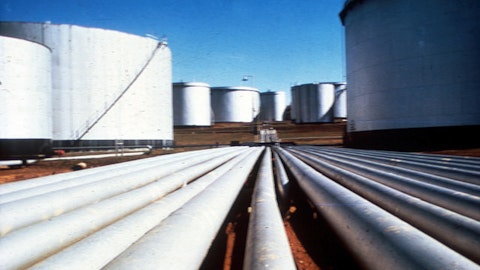New Jersey Resources Corporation (NYSE:NJR) Q2 2024 Earnings Call Transcript May 7, 2024
New Jersey Resources Corporation isn’t one of the 30 most popular stocks among hedge funds at the end of the third quarter (see the details here).
Operator: Thank you for standing by. My name is John, and I will be your conference operator today. At this time, I would like to welcome everyone to the New Jersey Resources Fiscal 2024 Second Quarter Conference Call and Wsebcast. [Operator Instructions]. I would now like to turn the call over to Adam Prior, Director of Investor Relations. Please go ahead.
Adam Prior: Thank you. Welcome to New Jersey Resources’ fiscal 2024 second-quarter conference call and webcast. I’m joined here today by Steve Westhoven, our President and CEO; Roberto Bel, our Senior Vice President and Chief Financial Officer; as well as other members of our senior management team. Certain statements in today’s call contain estimates and other forward-looking statements within the meaning of the securities laws. We wish to caution listeners of this call that the current expectations, assumptions, and beliefs forming the basis for our forward-looking statements include many factors that are beyond our ability to control or estimate precisely. This could cause results to differ materially from our expectations as found on slide 1.
These items can also be found in the forward-looking statements section of today’s earnings release furnished on Form 8-K and in our most recent Forms 10-K and 10-Q as filed with the SEC. We do not, by including this statement, assume any obligation to review or revise any particular forward-looking statements referenced herein in light of future events. We will also be referring to certain non-GAAP financial measures, such as net financial earnings or NFE. We believe that NFE, net financial loss, utility gross margin, financial margin, adjusted funds from operations, and adjusted debt provide a more complete understanding of our financial performance. However, these non-GAAP measures are not intended to be a substitute for GAAP. Our non-GAAP financial measures are discussed more fully in Item 7 of our 10-K.
The slides accompanying today’s presentation are available on our website and were furnished on our Form 8-K filed this morning. Our agenda for today is found on slide 4. Steve will begin with this year’s highlights, followed by Roberto, who will review our financial results, then we’ll open it up for your questions. With that said, I’ll turn the call over to our President and CEO, Steve Westhoven. Please go ahead, Steve.
Steve Westhoven: Thanks, Adam. Good morning, everyone. New Jersey Resources delivered a strong performance in the second quarter. We reported net financial earnings of $1.41 per share in the period, and we are reaffirming our fiscal 2024 NFEPS guidance range of $2.85 to $3 per share. I’ll take you through the highlights, which are outlined on slide 5 in our presentation. We continue to see a trend of strong customer growth at New Jersey Natural Gas and achieved higher utility gross margin for the quarter. Throughout a relatively warm winter marked by periods of volatility, New Jersey Natural Gas once again demonstrated its ability to provide cost-effective and reliable service. New Jersey Natural Gas has decoupled, meaning utility gross margin is insulated from changes due to weather and customer usage.
We continue to remain aligned with all of our stakeholders to provide the best most affordable service for our customers. During the period, we filed the base rate case to recover capital investments of approximately $850 million since the settlement of our last rate case in 2021 as well as a new SAVEGREEN program that represented the largest energy efficiency filing in our history. We remain active at Clean Energy Ventures with approximately 34 megawatts of projects under construction that will add to the 5 megawatts of capacity placed in service thus far this year. And our project pipeline is expanding, allowing this growth to continue well into the future. We reported solid contributions from S&T. And as we announced in our last conference call, energy services outperformed in January, capitalizing in a brief period of pricing volatility.
Moving to slide 6, in November, we provided NFEPS initial guidance range of $2.70 to $2.85 per share. As a result of our outperformance, we increased our fiscal 2024r NFEPS guidance by $0.15 per share in February. As discussed in prior calls, we expect fiscal 2024 to exceed our stated 7% to 9% long-term growth rate. Slide 7 shows the expected NFEPS percentage contribution by business segment for fiscal 2024, as well as a general guide for what we expect in the future. 2024 is somewhat unique, as energy services will represent a higher portion due to the AMAs and outperformance in the quarter. However, in future years, we expect to return to a more normalized segment breakout with 60% to 70% coming from our utility business. With that, I’ll turn the discussion over to our business units beginning on slide 8 with New Jersey Natural Gas.
We’ve invested $211 million at New Jersey Natural Gas through a variety of programs in fiscal 2024 with approximately 45% of that CapEx providing near real-time returns. Within that 45% is the SAVEGREEN program, which helps residential and commercial customers lower their energy usage. We have spent approximately $33 million thus far this year to help our customers save money and reduce their carbon footprint. We achieved solid new customer growth during the period through a combination of new construction and conversions throughout our service territories. Finally, we are continuing to pursue new innovations that further our decarbonization strategy. The example of this are two new carbon-capture units that we recently installed at our headquarters in New Jersey.

These units, which are in the initial phase of testing, are expected to reduce emissions profile per building while providing additional data as we pursue new decarbonization initiatives. By encouraging innovation in energy efficiency, green fuels, renewables, and other emerging technologies like carbon capture, we are demonstrating our ability to achieve long-term emissions reduction goals. Turning to slide 9, I’ll provide an update on our base rate case. On January 31, we requested an increase of base rates of approximately $223 million, an equivalent to an increase of $159 million in operating income. The rate case is progressing as expected, and we plan to update our filing to include nine months of actual results later this month. We will continue working with the New Jersey Board of Public Utilities towards a resolution that balances the interests of our customers and the company with new rates expected to be in place for fiscal 2025.
Moving to Slide 10, Clean Energy Ventures has continued to add new solar capacity during the fiscal year with an additional 34 megawatts under construction. We are also growing our solar pipeline, which now includes over 870 megawatts of potential investment options. Over the past few years, we’ve expanded our portfolio geographically with 51% of our pipeline outside of New Jersey. Our focus is on developing solar investment opportunities that provide high single-digit unlevered returns. Finally, our S&T business performed to our expectations during the period. We continue to pursue organic growth opportunities to maximize those assets. At Leaf River, we are initiating the capital investment process to expand the working capacity within our cabins by approximately 4 BCF.
We recently initiated an open season to provide additional capacity to our customers and regions with considerable demand for reliable and affordable natural gas storage capabilities. With that, I’ll turn the call over to Roberto for a review of our financial results. Roberto?
Roberto Bel: Thank you, Steve. And good morning, everyone. Slide 13 shows the main drivers of our NFE for our fiscal 2024 second quarter and first half. In the second quarter, we reported NFE of $138.6 million or $1.41 per share compared with NFE of $112.3 million or $1.16 per share last year. New Jersey Natural Gas reported NFE in line with expectations as higher utility gross margin was partially offset by higher depreciation and operating expenses. Clean Energy Ventures NFE improved for the period by $3.8 million, largely due to an increase in earnings related to the recognition of investment tax credits associated with financing transactions. Storage and transportation energy remained largely flat for the period, while energy services reported NFE of $37.6 million compared to $21.1 million in the second quarter of the prior year.
This outperformance was driven by energy services capturing additional financial margin during brief periods of volatility in the winter. As we look to the remainder of fiscal 2024, it’s important to note that we expect to recognize a significant portion of the asset management agreements total revenues during our fiscal fourth quarter. I’ll move through the next few slides quickly as our capital plan, cash flows, and balance sheet projections remain largely unchanged from our previous goal. Turning to our capital plan on slide 14, for the next few years, we expect to invest between $1.2 billion and $1.5 billion across the company. And as Steve mentioned earlier, we began a new capital project at Leaf River and amended a capital plan to account for approximately $11 million of additional investment at in fiscal 2024.
Our capital projections are anchored by strong cash flow from operations. On slide 15, we expect cash flow from operations to range between $450 million and $490 million in both fiscal 2024 and fiscal 2025. Slide 16 shows this NJR’s credit metrics. We continue to project NJR’s adjusted FFO to adjusted debt to be between 17% and 18% for the year. While we have no plans to issue block equity, our existing dividend reinvestment program includes a waiver discount feature that allows us to raise equity on an opportunistic basis. Finally, on slide 17, we provide a breakout of our long-term debt. As you can see, most of our debt is fixed rate in nature, and we do not have significant maturities in any particular year. For the remainder of fiscal 2024, we do not have any debt maturities.
NFEPS guidance for fiscal 2024 and our long-term NFEPS growth guidance assumes higher interest rates for longer, and we have substantial liquidity at both NJR and NJNG. With that, I will turn the call back to Steve.
Steve Westhoven: Thanks, Roberto. In conclusion, thanks to higher NFE contributions from energy services and steady performance from our core businesses, fiscal 2024 is outperforming our initial expectations. NJR benefits from operating a complementary portfolio of businesses that are essential to sustain growth. These assets are dependable cash generators and difficult to replicate. We continue to pursue organic expansion to maximize NJR’s earning potential and support our peer-leading growth rate. As always, I want to thank all our employees for their hard work. And with that, let’s open the call for any questions.
See also 10 Leisure and Recreation Services Stocks to Buy and 25 States with Highest Mortgage Delinquency Rates.
Q&A Session
Follow New Jersey Resources Corp (NYSE:NJR)
Follow New Jersey Resources Corp (NYSE:NJR)
Receive real-time insider trading and news alerts
Operator: [Operator Instructions]. The first question comes from the line of Richard Sunderland from JPMorgan.
Richard Sunderland: Great, thanks, and thanks for the time today. Maybe starting with Leaf River, the capacity recovery project, could you speak a little bit more to this in terms of if this is a precursor to a larger expansion of Leaf River? How should we think about the financial impact and timing of contributions from the incremental capacity? Any other key details here would be helpful.
Steve Westhoven: Certainly, we’ve got nothing to announce as far as the larger expansion goes. But for the work that’s being done there now, it certainly could be helpful in future expansion and some pumps and some de-grinding, dewatering capability. But I think the focus on is projects like these — in these sciences that help with just organic expansion in the company and our ability to grow. We just completed the open season. It concluded [indiscernible] and we haven’t’ analyzed all the details yet. We just have some contracts to do. But just to speak to the economics, we’re very optimistic about the project and fully believe that we’ll be moving forward with this. So we’ll sit on that until we get to final contracts and details associated with it.
Richard Sunderland: Understood. Thanks for the commentary there, though. And then turning to CEV, just curious about how you’re thinking of New Jersey at this point. I believe the most recent solicitations selected one of your projects. Any thoughts on pricing, future expectations to deploy more megawatts through this process? Any other learnings?
Steve Westhoven: So yes, we were happy to see that New Jersey’s new forward — the CSI program, and that’s moving forward, contracts that are 5 megawatts and greater. So good to see that it’s going forward. And we did have one project that was on our own in there. As far as further comments about it, we do have relationships with a number of other developers. So we expect that it will be certainly acted in the New Jersey solar market. But I think from an investor standpoint, to look at this from a project pipeline point of view, we’ve got 874 megawatts in our project pipeline in CEV. And that’s more than enough to give us investment opportunities in the near future. As far as returns go, again, we’re still targeting the high single-digit return for projects moving forward, and that’s our yardstick to continue to make investments. So overall, constructive that things are moving forward. And we’re optimistic about our pipeline also going forward as well.
Richard Sunderland: Understood. That’s very helpful. Maybe just a quick follow up on the CEV front. Given data centers are so topical these days, curious how you think about data center demand and the state’s efforts there, and if that might impact the CEV outlook, either New Jersey or I guess your regional efforts.
Steve Westhoven: I think, more broadly, it just really points to the amount of infrastructure that we’re going to need in order to supply all the energy that we have for all the endeavors moving forward, whether it’s data centers or electric cars or just reliability in general. So as energy demand grows, bringing all of our infrastructure into the picture and using that in the longer term is going to be extremely important. So extremely constructive for the assets that we hold in the infrastructure business in general.
Operator: [Operator Instructions]. As there are no further questions at this time, this concludes our Q&A session. I would like to turn the call over back to Adam for closing remarks.
Adam Prior: Well, thanks, everyone, for joining us this morning. As a reminder, a recording of this call is available for replay on our website. Later this month, we are attending the American Gas Association or AGA Financial Forum, and we hope to see many of you there. As always, we appreciate your interest and investment in NJR. Have a good one.
Operator: Ladies and gentlemen, this concludes today’s conference call. Thank you for your participation. You may now disconnect.
Follow New Jersey Resources Corp (NYSE:NJR)
Follow New Jersey Resources Corp (NYSE:NJR)
Receive real-time insider trading and news alerts




